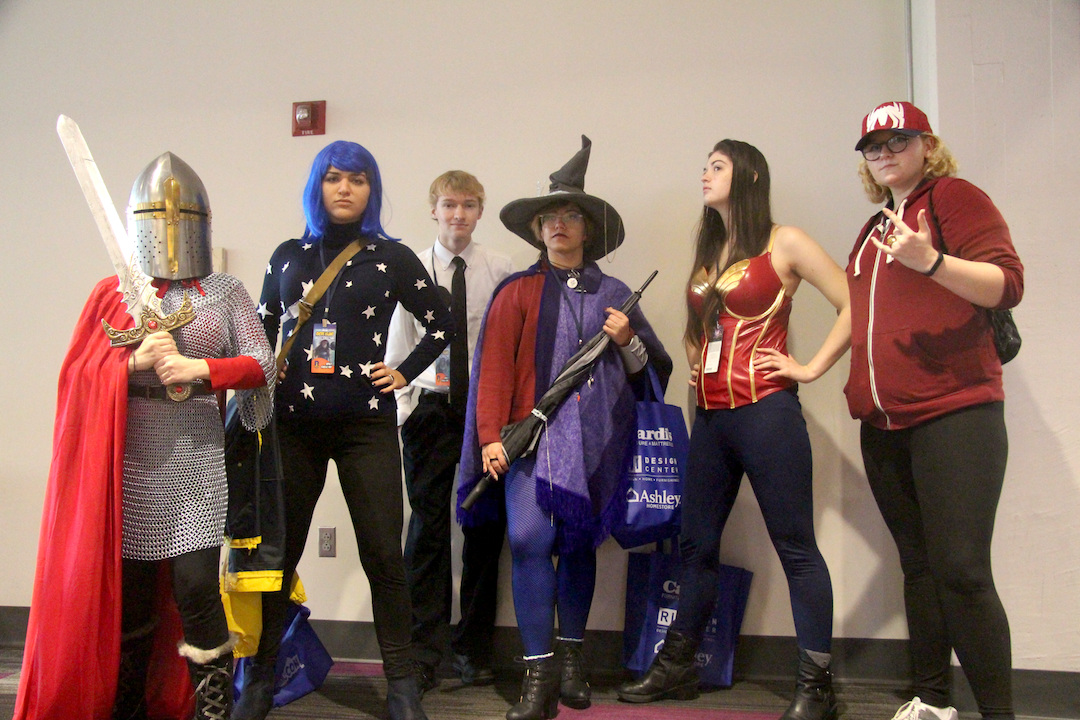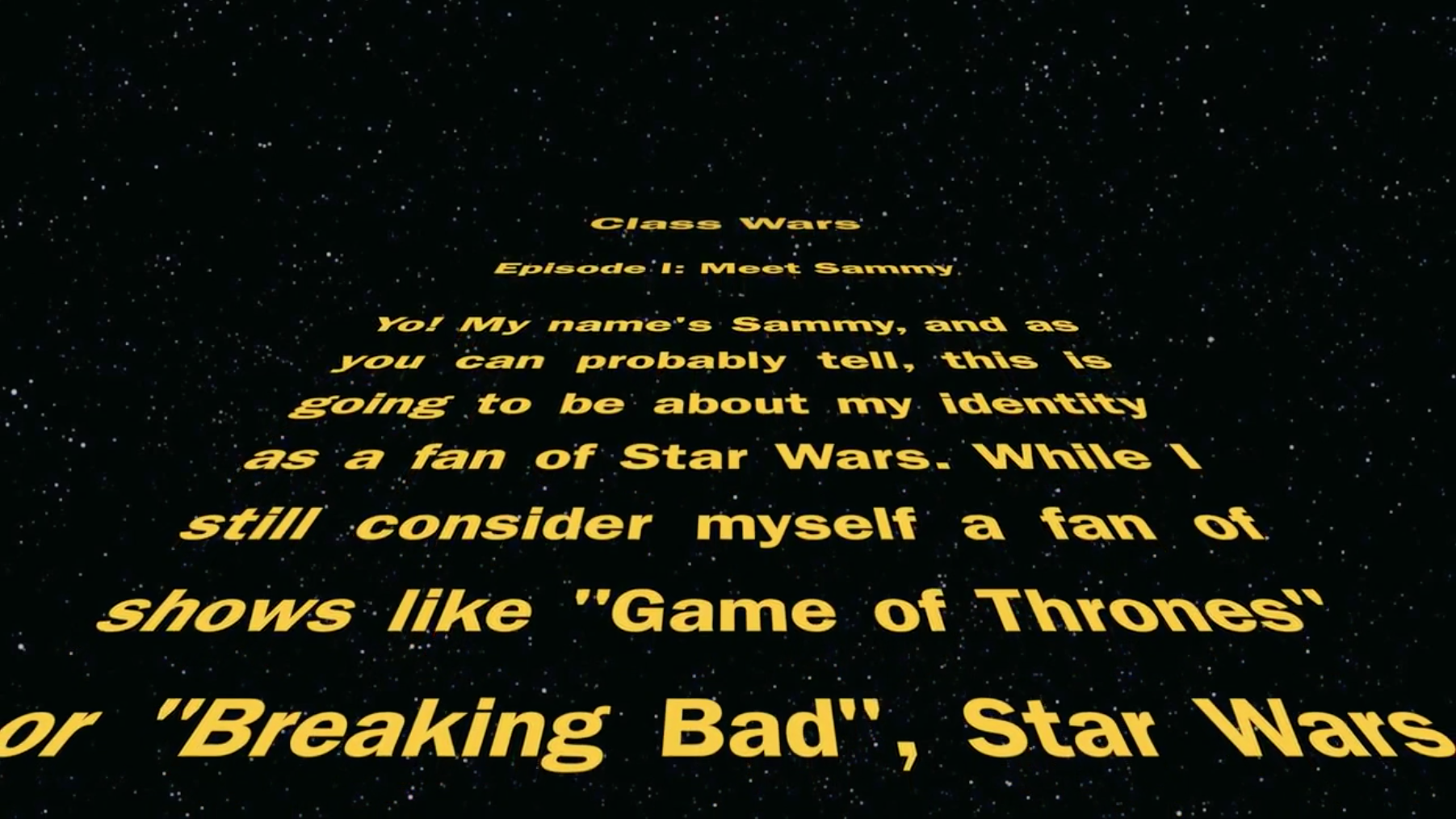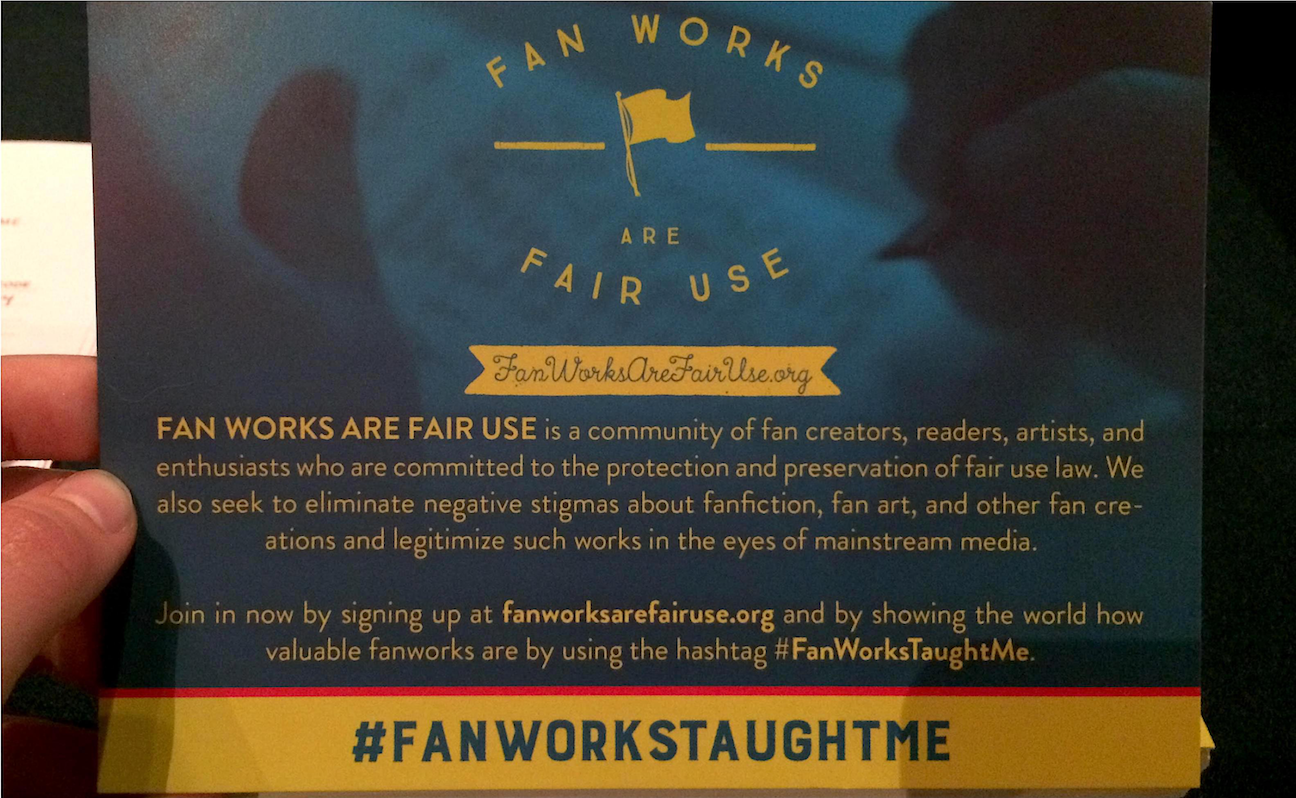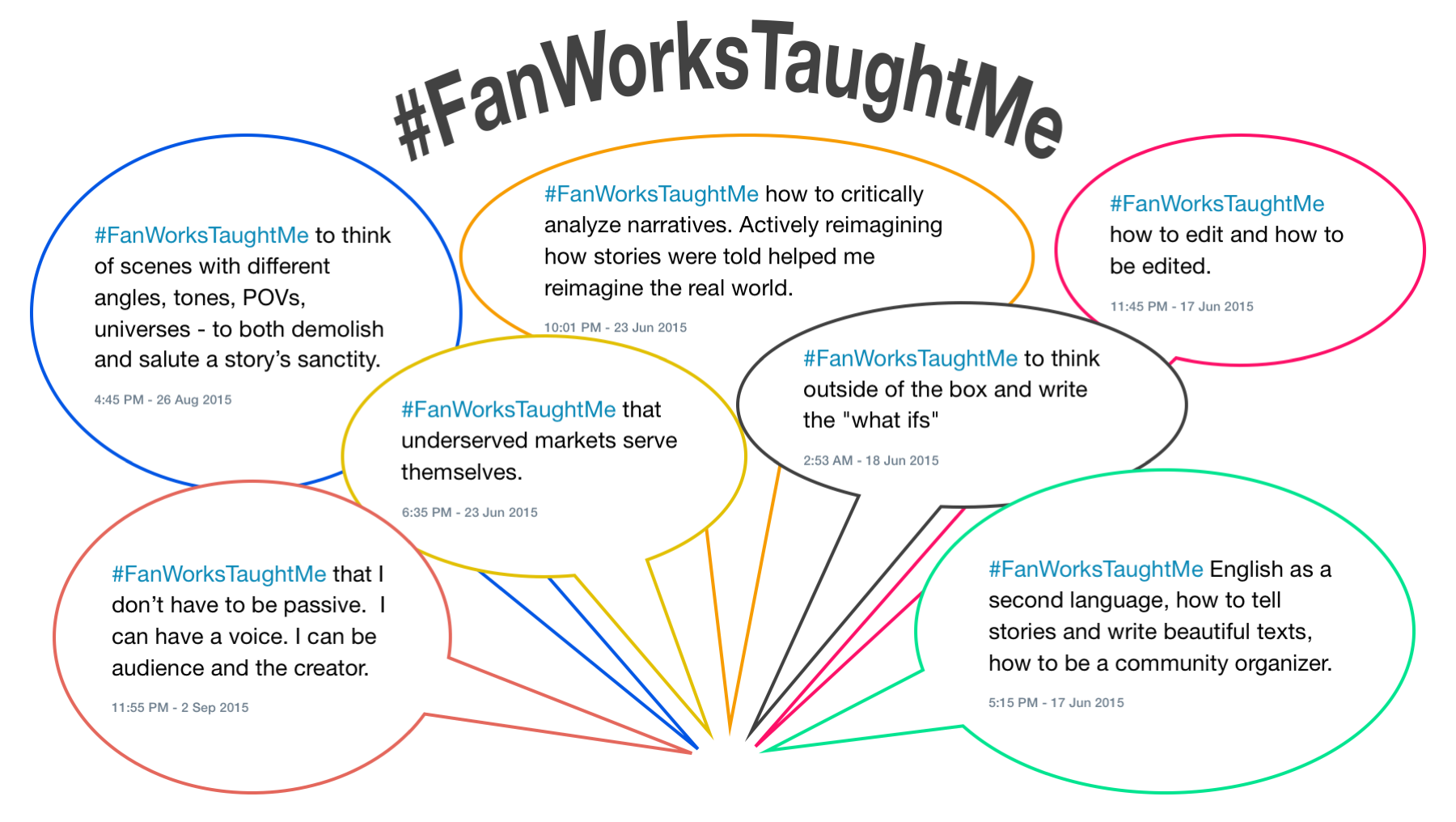“I’m not really a ‘fan’, but…”: Fandom, Learning and the Future of Higher Education
Josh Stenger, Wheaton College (Massachusetts)

In two recent articles for Flow, I’ve attempted to make the case that as colleges and universities take up the hard but exciting work of transforming higher education for the twenty-first century, fan studies offers a useful model for many areas of the academy that have begun to think seriously about alternatives to certain structures and practices long considered to be irradicable. This view derives in large part from the basic fact that, like most academic fields with comparably complex genealogies, fan studies exists despite rather than because of the entrenched institutional practice of organizing knowledge – and with it, curricula, research opportunities, and staffing decisions – in primarily disciplinary terms.
Obviously we want our students to acquire knowledge, and to develop skills, competencies, and ethics that prepare them not just for the classroom or the workplace, but for the world they will go on to shape. Perhaps there are some scenarios in which this is accomplished more effectively by fostering students’ disciplinary expertise than their intellectual curiosity and ability (to learn how) to learn, but I confess none come immediately to mind. Which brings me to the focus of this, the third and final installment of my short treatise on fan studies and higher education: namely, that participatory fandom is legible as a mode of integrative, often autonomous learning, one that presents higher education with a sui generis opportunity to help undergraduates identify the skills and habits of mind they have already developed as fans, then strengthen and apply these in intentional, edifying ways in more traditional academic settings.

LARP: Learning As Role Playing
The Twitter exchange pictured in the screenshot above took place the day before the start of a first year seminar I taught last Fall called Fan Communities and Creations. It perfectly (and quite charmingly) anticipated a conversation I planned to have with the class the following day and that I suspect virtually everyone who teaches a course or a unit on fandom has with theirs, in some form or other, early on: What does it actually mean to be a “fan”? Working toward an answer to this question allows us to begin drawing links between fandom and fan studies, in part by identifying ways to close the distance between the affect commonly associated with young people’s media consumption and the intellect typically associated with higher education. To get the ball rolling rarely requires more than pointing out that seemingly simple questions often have very complex answers, and then asking, again, “What does it mean to be a fan?”

This is also an opportunity to have a discussion about the labels and/or roles with which we identify (or from which we distance ourselves), and how and why they matter. Here, the question becomes “What does it mean to be a fan?” This is a worthwhile conversation in any undergraduate fan studies course, but especially so in a room full of first-semester, first-year students on the first day of class. Before the conversation moves too far away from roles and role-playing, I ask everyone to consider what, if anything, might change – for them, for others – if they thought of themselves not as “students”, but as “learners”, especially if we stipulate the following:
Students study. Learners learn.
Students have teachers. Learners learn.
Students attend classes and schools. Learners learn.
Students write essays and take exams. Learners learn.
Students pass and fail. Learners learn.
Students graduate. Learners learn.
This exercise is not meant to besmirch being a student, but to make visible the fact that whereas learning can be undertaken somewhat autonomously, a student’s relationship to knowledge is impacted and arguably circumscribed by multiple, often mutually reinforcing factors. Thus, being a student does not necessarily prepare one to be a strong learner, but being a learner will very likely prepare one to be a strong student. Nevertheless, undergraduates seem firmly attached to their student identities, and just as reluctant to identify as learners.
It occurs to me that this dynamic may in fact be homologous to the one that I believe motivated my student to make clear that she was “not a ‘fan’” only to immediately (and unselfconsciously) enthuse about the chance to don her Merlin-inspired chain mail body armor, battle helmet and broadsword. Why reject the “fan” label one minute then embrace the accoutrements of fandom the next? Was it because she could disappear into the latter but had to declare and own the former? Was it because wearing chain mail was ‘just’ cosplay but being a fan was an identity?
My sense is that there is a strong but misunderstood parallel here with respect to considering oneself a “student” or a “learner”. The educational system and its institutions, to say nothing of the popular culture, have so thoroughly naturalized the role of “student” for young adults that by the time they arrive to college, it is almost inconceivable that they could be anything else. If they are students IRL, learning becomes relegated to a kind of role-playing, a very different version of LARP. Unfortunately, this is quite backwards. Students are students within an academic context, yes, but what about when they are interns, employees, athletes, tutors, friends, partners, parents, and so on? There is ample room in all of these roles to be a learner, though, just as one can be a fan regardless of what book one is reading or what show one is watching.
Learners and fans have much in common, beginning with the decision to identify as such. Unlike being a student or a consumer, to identify as a learner or a fan is to name oneself rather than be named. Whether or not it registers as such immediately, it is also an assertion of agency, one that both requires and reflects a degree of self-knowledge and self-acceptance. It is a declaration of intellectual curiosity as well as of a desire and capacity to become autodidactic. It is an acknowledgement that every person has a right to make meaning, and to access and produce knowledge. And as the closing section below illustrates, it has absolutely nothing to do with whether or not one is enrolled in a college or university.
#FanWorksTaughtMe
In mid-June 2015, anxious that a Congressional review of U.S. copyright laws might result in changes that would have a chilling effect on fanworks, The Harry Potter Alliance took preemptive action in the form of Fan Works Are Fair Use. During the weeks that followed, groups such as the Organization for Transformative Works and the Supernatural Wiki expressed their solidarity, promoting the campaign at the San Diego Comic Con and providing signal boosts on social media.

Rather than rely solely on the name of the campaign, organizers of Fan Works Are Fair Use encouraged online supporters to “[show] the world how valuable fanworks are by using the hashtag #FanWorksTaughtMe.” At first glance, one might read the wording here as counter-intuitive insofar as it emphasized personal anecdote over organized action. To do so, however, would be to overlook the way in which #FanWorksTaughtMe strategically drew together the individual (‘me’) and the collective (‘fanworks’, and by extension those who create them). Crucially, the relationship between them is structured not around the former’s affective attachment to the latter, but rather around their shared investment in and respect for the kind of informal education that regularly takes place within fandoms but that is rarely valued in traditional academic settings.
A Twitter search for tweets using the #FanWorksTaughtMe hashtag produced fewer than 300 results.[1] This is a modest number, to be sure, yet more than large enough to reflect a wide range of focus, voice, and even ostensible purpose and perceived audience. In tweet after tweet, users credit fanworks with teaching them to be a documentary filmmaker, a community organizer, a podcaster, a musician, to build worlds and share them, to give and take criticism with grace, to persevere, to respect others even in the absence of understanding them, that their stories and voices matter, that they are not alone, that their credentials don’t necessarily reflect their potential. The list goes on.

Diverse as they are, the individual voices in this conversation give rise to a unified and unifying message, one that celebrates creativity; defends individuals’ right to create, and thus to make, transform, and question meaning; and that attributes their respective and collective knowledge not to a college education, but to fans, fandom, and fanworks. In this, they recall Claire Pentecost’s concept of the artist as Public Amateur, someone who “learns outside the circuits of professional normalization and reward,” and who embodies
[…] a proposition of active social participation in which any non-specialist is empowered to take the initiative to question something within a given discipline, acquire knowledge in a non-institutionally sanctioned way, and assume the authority to interpret that knowledge, especially in regard to decisions that affect our lives.[2]
Like Lawrence Lessig’s discussion of read/write culture,[3] and Henry Jenkins’s application of collective intelligence and popular epistemologies,[4], Pentecost’s construct of the public amateur serves as yet another potent reminder of the growing importance of informal knowledge networks.
As higher education contemplates ways to coexist with these networks and how to implement the inevitable shift in undergraduate education away from a focus on disciplinary expertise and toward more dynamic and integrative forms of learning, it would do well to keep fans and fandom in mind. Consider, for instance, that although they may not always think of their fannish behavior in these terms, fans tend to have strong online research skills; know how to differentiate between primary and secondary sources; are able to evaluate the reliability of information they encounter; regularly produce close, critical readings of texts; participate actively in online knowledge and affinity communities; and are prolific creators and sharers of digital content and transformative works. And that’s often before they even get to college. Imagine if, once there, their institution valued and helped to strengthen these skills rather than dismiss them as undisciplined, or inadequately disciplinary.
Image Credits:
1. Rhode Island Comic Con (Nov. 3, 2018); photograph by author
2. “I’m not really a ‘fan’, but…” via Twitter; author’s screenshot
3. Still of first-year student’s video autoethnography on fan identity; author’s screenshot
4. Image via Twitter user @TheHPAlliance (July 9, 2015)
5. #FanWorksTaughtMe tweets via Twitter; collage by author.
Please feel free to comment.
- This number reflects the results of a Twitter search executed in May 2019 for tweets published during the Fan Works Are Fair Use campaign (roughly mid-2015 through early 2016). It will not include any tweets posted by users who have removed their accounts or changed their Twitter handles, and thus the number of tweets returned by the search is virtually certain to be lower than the actual number of tweets that made of use of the #FanWorksTaughtMe hashtag. [↩]
- Claire Pentecost, The Public Amateur, https://publicamateur.wordpress.com/about/ [n.d.].00 [↩]
- Lawrence Lessig, Remix: Making art and commerce thrive in the hybrid economy (London: Bloomsbury, 2008), chapters 1 and 4. [↩]
- Henry Jenkins, Convergence Culture: Where Old and New Media Collide (New York: NYU Press, 2006), chapter 1. [↩]